资源下载:https://github.com/mengning/mykernel
实验内容:
1、配置实验环境,完成Linux内核编译。
2、对系统源码进行修改,基于mykernel 2.0实现一个简单的操作系统内核。
3、简要分析操作系统内核核心功能及运行工作机制。
实验环境:
VMWare虚拟机下的Ubuntu18.04.4,实验采用的内核版本为linux-5.4.34。
1 内核编译
1.1 准备工作
1.1.1 修改镜像源地址
为了节省资源下载时间,使用国内镜像源。
cd /etc/apt/
sudo cp sources.list sources.list.bk
sudo gedit sources.list
deb http://mirrors.aliyun.com/ubuntu bionic main multiverse restricted universe
deb http://mirrors.aliyun.com/ubuntu bionic-updates main multiverse restricted universe
deb http://mirrors.aliyun.com/ubuntu bionic-security main multiverse restricted universe
deb http://mirrors.aliyun.com/ubuntu bionic-proposed main multiverse restricted universe
deb http://mirrors.aliyun.com/ubuntu bionic-backports main multiverse restricted universe
将sources.list修改保存后,更新apt源。
sudo apt-get update
1.1.2 添加hosts映射
新增GitHub资源域名与对应IP的映射。
sudo vi /etc/hosts
151.101.76.133 raw.githubusercontent.com
1.1.3 安装axel
多线程下载工具,用于下载Linux内核。
sudo apt install axel
1.2 下载内核补丁
wget https://raw.github.com/mengning/mykernel/master/mykernel-2.0_for_linux-5.4.34.patch
补丁文件如下,根据diff对比,主要做了以下改动:
- 在时钟中断时调用自定义的my_timer_handler函数,打印输出>>>>>>>my_timer_handler here<<<<<<<<
- 在start_kernel.h与timer.h中分别声明my_start_kernel与my_timer_handler函数
- 在main.c中调用my_start_kernel函数
- 在Makefile中新增mykernel的编译路径
- 创建mykernel的Makefile文件
- 编写myinterrupt.c与mymain.c文件,mymain.c中模拟系统运行,每100000次循环输出一次
diff -Naur linux-5.4.34/arch/x86/kernel/time.c linux-5.4.34-mykernel/arch/x86/kernel/time.c
--- linux-5.4.34/arch/x86/kernel/time.c 2020-04-21 15:05:05.000000000 +0800
+++ linux-5.4.34-mykernel/arch/x86/kernel/time.c 2020-04-25 21:58:16.436717811 +0800
@@ -16,6 +16,7 @@
#include <linux/irq.h>
#include <linux/i8253.h>
#include <linux/time.h>
+#include <linux/timer.h>
#include <linux/export.h>
#include <asm/vsyscall.h>
@@ -59,6 +60,7 @@
static irqreturn_t timer_interrupt(int irq, void *dev_id)
{
global_clock_event->event_handler(global_clock_event);
+ my_timer_handler();
return IRQ_HANDLED;
}
diff -Naur linux-5.4.34/include/linux/start_kernel.h linux-5.4.34-mykernel/include/linux/start_kernel.h
--- linux-5.4.34/include/linux/start_kernel.h 2020-04-21 15:05:05.000000000 +0800
+++ linux-5.4.34-mykernel/include/linux/start_kernel.h 2020-04-25 22:00:17.304717811 +0800
@@ -9,6 +9,7 @@
up something else. */
extern asmlinkage void __init start_kernel(void);
+extern void __init my_start_kernel(void);
extern void __init arch_call_rest_init(void);
extern void __ref rest_init(void);
diff -Naur linux-5.4.34/include/linux/timer.h linux-5.4.34-mykernel/include/linux/timer.h
--- linux-5.4.34/include/linux/timer.h 2020-04-21 15:05:05.000000000 +0800
+++ linux-5.4.34-mykernel/include/linux/timer.h 2020-04-25 21:56:45.064717811 +0800
@@ -193,6 +193,8 @@
extern void init_timers(void);
extern void run_local_timers(void);
+extern void my_timer_handler(void);
+
struct hrtimer;
extern enum hrtimer_restart it_real_fn(struct hrtimer *);
diff -Naur linux-5.4.34/init/main.c linux-5.4.34-mykernel/init/main.c
--- linux-5.4.34/init/main.c 2020-04-21 15:05:05.000000000 +0800
+++ linux-5.4.34-mykernel/init/main.c 2020-04-25 22:01:13.476717811 +0800
@@ -781,6 +781,7 @@
arch_post_acpi_subsys_init();
sfi_init_late();
+ my_start_kernel();
/* Do the rest non-__init'ed, we're now alive */
arch_call_rest_init();
}
diff -Naur linux-5.4.34/Makefile linux-5.4.34-mykernel/Makefile
--- linux-5.4.34/Makefile 2020-04-21 15:05:05.000000000 +0800
+++ linux-5.4.34-mykernel/Makefile 2020-04-25 22:02:47.144717811 +0800
@@ -1012,7 +1012,7 @@
export MODORDER := $(extmod-prefix)modules.order
ifeq ($(KBUILD_EXTMOD),)
-core-y += kernel/ certs/ mm/ fs/ ipc/ security/ crypto/ block/
+core-y += kernel/ certs/ mm/ fs/ ipc/ security/ crypto/ block/ mykernel/
vmlinux-dirs := $(patsubst %/,%,$(filter %/, $(init-y) $(init-m)
$(core-y) $(core-m) $(drivers-y) $(drivers-m)
diff -Naur linux-5.4.34/mykernel/Makefile linux-5.4.34-mykernel/mykernel/Makefile
--- linux-5.4.34/mykernel/Makefile 1970-01-01 08:00:00.000000000 +0800
+++ linux-5.4.34-mykernel/mykernel/Makefile 2020-04-25 17:14:13.537908421 +0800
@@ -0,0 +1,6 @@
+#
+# Makefile for the linux mykernel.
+#
+
+obj-y = mymain.o myinterrupt.o
+
diff -Naur linux-5.4.34/mykernel/myinterrupt.c linux-5.4.34-mykernel/mykernel/myinterrupt.c
--- linux-5.4.34/mykernel/myinterrupt.c 1970-01-01 08:00:00.000000000 +0800
+++ linux-5.4.34-mykernel/mykernel/myinterrupt.c 2020-04-25 19:09:50.612555999 +0800
@@ -0,0 +1,44 @@
+/*
+ * linux/mykernel/myinterrupt.c
+ *
+ * Kernel internal my_timer_handler
+ *
+ * Copyright (C) 2013 Mengning
+ *
+ */
+#include <linux/kernel_stat.h>
+#include <linux/export.h>
+#include <linux/interrupt.h>
+#include <linux/percpu.h>
+#include <linux/init.h>
+#include <linux/mm.h>
+#include <linux/swap.h>
+#include <linux/pid_namespace.h>
+#include <linux/notifier.h>
+#include <linux/thread_info.h>
+#include <linux/time.h>
+#include <linux/jiffies.h>
+#include <linux/posix-timers.h>
+#include <linux/cpu.h>
+#include <linux/syscalls.h>
+#include <linux/delay.h>
+#include <linux/tick.h>
+#include <linux/kallsyms.h>
+#include <linux/irq_work.h>
+#include <linux/sched.h>
+#include <linux/sched/sysctl.h>
+#include <linux/slab.h>
+
+#include <asm/uaccess.h>
+#include <asm/unistd.h>
+#include <asm/div64.h>
+#include <asm/timex.h>
+#include <asm/io.h>
+
+/*
+ * Called by timer interrupt.
+ */
+void my_timer_handler(void)
+{
+ pr_notice("
>>>>>>>>>>>>>>>>>my_timer_handler here<<<<<<<<<<<<<<<<<<
");
+}
diff -Naur linux-5.4.34/mykernel/mymain.c linux-5.4.34-mykernel/mykernel/mymain.c
--- linux-5.4.34/mykernel/mymain.c 1970-01-01 08:00:00.000000000 +0800
+++ linux-5.4.34-mykernel/mykernel/mymain.c 2020-04-25 19:10:27.635058000 +0800
@@ -0,0 +1,91 @@
+/*
+ * linux/mykernel/mymain.c
+ *
+ * Kernel internal my_start_kernel
+ *
+ * Copyright (C) 2013 Mengning
+ *
+ */
+#include <linux/types.h>
+#include <linux/module.h>
+#include <linux/proc_fs.h>
+#include <linux/kernel.h>
+#include <linux/syscalls.h>
+#include <linux/stackprotector.h>
+#include <linux/string.h>
+#include <linux/ctype.h>
+#include <linux/delay.h>
+#include <linux/ioport.h>
+#include <linux/init.h>
+#include <linux/initrd.h>
+#include <linux/acpi.h>
+#include <linux/tty.h>
+#include <linux/percpu.h>
+#include <linux/kmod.h>
+#include <linux/vmalloc.h>
+#include <linux/kernel_stat.h>
+#include <linux/start_kernel.h>
+#include <linux/security.h>
+#include <linux/smp.h>
+#include <linux/profile.h>
+#include <linux/rcupdate.h>
+#include <linux/moduleparam.h>
+#include <linux/kallsyms.h>
+#include <linux/writeback.h>
+#include <linux/cpu.h>
+#include <linux/cpuset.h>
+#include <linux/cgroup.h>
+#include <linux/efi.h>
+#include <linux/tick.h>
+#include <linux/interrupt.h>
+#include <linux/taskstats_kern.h>
+#include <linux/delayacct.h>
+#include <linux/unistd.h>
+#include <linux/rmap.h>
+#include <linux/mempolicy.h>
+#include <linux/key.h>
+#include <linux/buffer_head.h>
+#include <linux/debug_locks.h>
+#include <linux/debugobjects.h>
+#include <linux/lockdep.h>
+#include <linux/kmemleak.h>
+#include <linux/pid_namespace.h>
+#include <linux/device.h>
+#include <linux/kthread.h>
+#include <linux/sched.h>
+#include <linux/signal.h>
+#include <linux/idr.h>
+#include <linux/kgdb.h>
+#include <linux/ftrace.h>
+#include <linux/async.h>
+#include <linux/sfi.h>
+#include <linux/shmem_fs.h>
+#include <linux/slab.h>
+#include <linux/perf_event.h>
+#include <linux/file.h>
+#include <linux/ptrace.h>
+#include <linux/blkdev.h>
+#include <linux/elevator.h>
+
+#include <asm/io.h>
+#include <asm/bugs.h>
+#include <asm/setup.h>
+#include <asm/sections.h>
+#include <asm/cacheflush.h>
+
+#ifdef CONFIG_X86_LOCAL_APIC
+#include <asm/smp.h>
+#endif
+
+
+void __init my_start_kernel(void)
+{
+ int i = 0;
+ while(1)
+ {
+ i++;
+ if(i%100000 == 0)
+ pr_notice("my_start_kernel here %d
",i);
+
+ }
+}
diff -Naur linux-5.4.34/mykernel/README.md linux-5.4.34-mykernel/mykernel/README.md
--- linux-5.4.34/mykernel/README.md 1970-01-01 08:00:00.000000000 +0800
+++ linux-5.4.34-mykernel/mykernel/README.md 2020-04-25 22:18:46.512717811 +0800
@@ -0,0 +1,21 @@
+mykernel 2.0
+==========
+Develop your own OS kernel by reusing Linux infrastructure, based on x86-64/Linux Kernel 5.4.34.
+
+## Set up mykernel 2.0 in Ubuntu 18.04
+
+```
+sudo apt install build-essential
+sudo apt install axel
+sudo apt install qemu # install QEMU
+sudo apt install libncurses-dev bison flex libssl-dev libelf-dev
+wget https://raw.github.com/mengning/mykernel/master/mykernel-2.0_for_linux-5.3.34.patch
+axel -n 20 https://mirrors.edge.kernel.org/pub/linux/kernel/v5.x/linux-5.4.34.tar.xz
+xz -d linux-5.4.34.tar.xz
+tar -xvf linux-5.4.34.tar
+cd linux-5.4.34
+patch -p1 < ../mykernel-2.0_for_linux-5.3.34.patch
+make defconfig # Default configuration is based on 'x86_64_defconfig'
+make -j$(nproc)
+qemu-system-x86_64 -kernel arch/x86/boot/bzImage
+```
1.3 下载内核
sudo axel -n 20 https://mirrors.edge.kernel.org/pub/linux/kernel/v5.x/linux-5.4.34.tar.xz
xz -d linux-5.4.34.tar.xz
tar -xvf linux-5.4.34.tar
1.4 安装补丁
cd linux-5.4.34
sudo apt install patch
patch -p1 < ../mykernel-2.0_for_linux-5.4.34.patch
1.5 编译内核
在虚拟机环境下,如果物理机支持超线程,可以配置虚拟机为双核四线程。
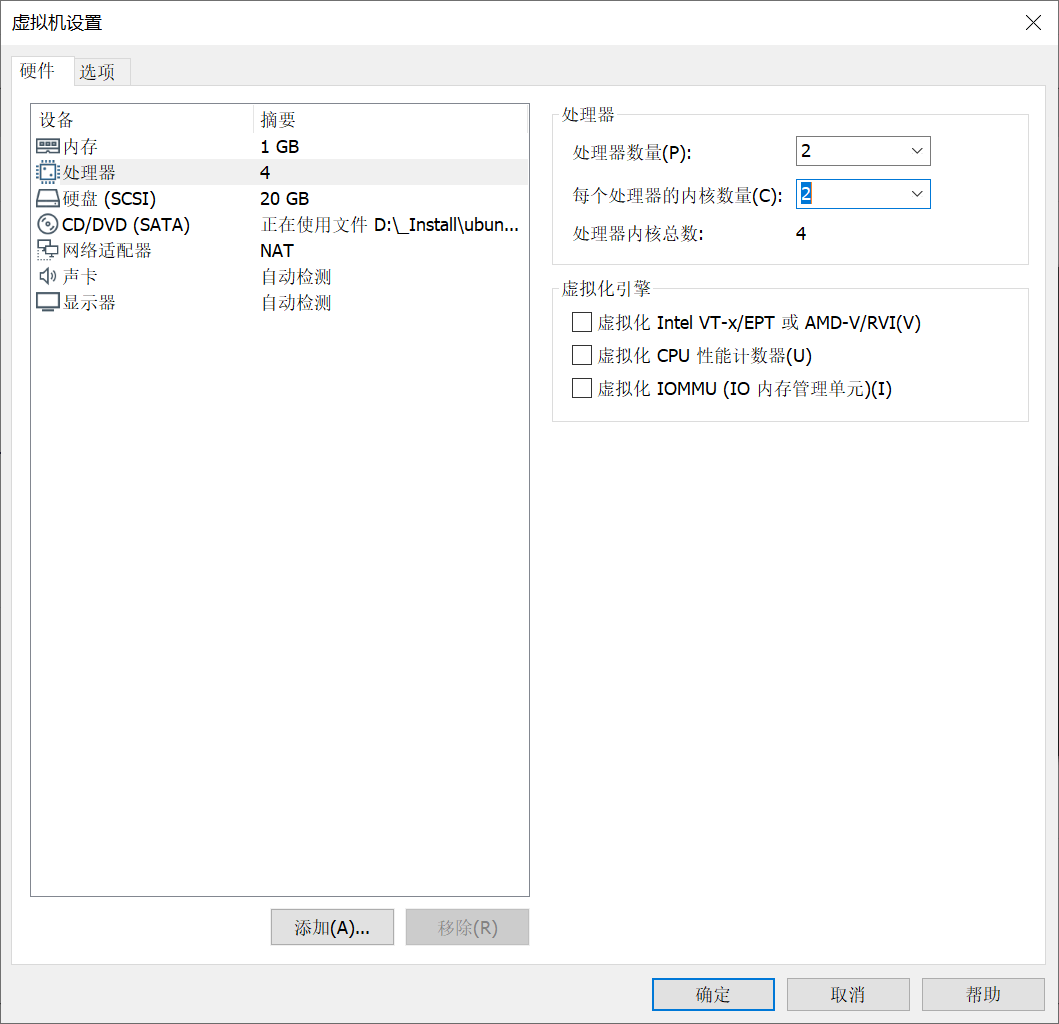
编译时间大致四五分钟左右,如果虚拟机默认配置单核单线程,使用defconfig需要较长的编译时间。
sudo apt install build-essential libncurses-dev bison flex libssl-dev libelf-dev
make defconfig
make -j$(nproc)
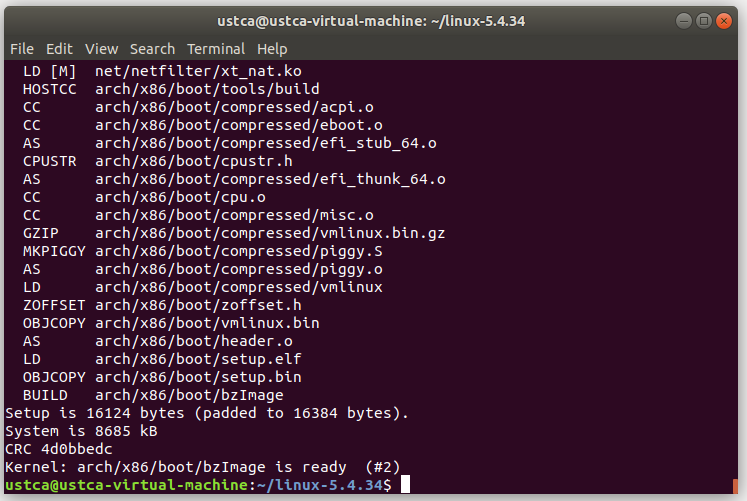
1.6 安装QEMU模拟器
此处QEMU用于模拟硬件设备,通过模拟一台独立运行操作系统的虚拟机,运行编译后的系统。
sudo apt install qemu # install QEMU
qemu-system-x86_64 -kernel arch/x86/boot/bzImage
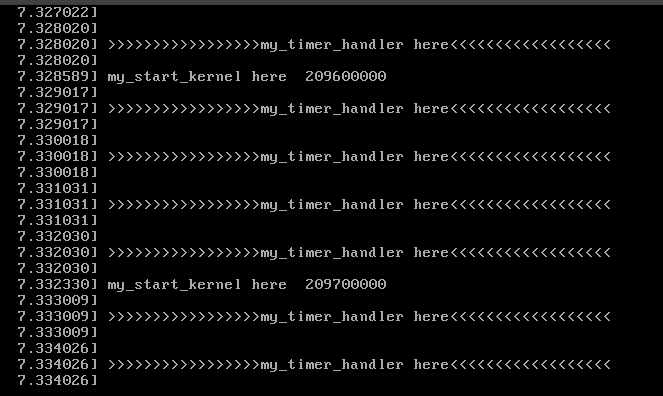
至此,Linux内核编译完成,大致的配置流程为:
- 下载内核补丁
- 下载系统内核
- 通过给系统打补丁后编译运行,观察内核运行与中断的输出
2 修改内核
首先,在mykernel目录下创建mypcb.h头文件:
-
Thread结构体模拟指令指针与堆栈指针
-
PCB结构体实现进程控制块,主要包含进程句柄,状态,栈,线程信息,进程函数等,next以链表形式链接进程
#define MAX_TASK_NUM 4
#define KERNEL_STACK_SIZE 1024*2
struct Thread {
unsigned long ip;
unsigned long sp;
};
typedef struct PCB{
int pid;
volatile long state; /* -1 unrunnable, 0 runnable, >0 stopped */
unsigned long stack[KERNEL_STACK_SIZE];
struct Thread thread;
unsigned long task_entry;
struct PCB *next;
}tPCB;
void my_schedule(void);
之后创建myinterrupt.c文件,实现中断效果以及进程间的切换:
#include "mypcb.h"
extern tPCB task[MAX_TASK_NUM];
extern tPCB * my_current_task;
extern volatile int my_need_sched;
volatile int time_count = 0;
/*
* Called by timer interrupt.
* it runs in the name of current running process,
* so it use kernel stack of current running process
*/
void my_timer_handler(void)
{
if(time_count%1000 == 0 && my_need_sched != 1)
{
printk(KERN_NOTICE ">>>my_timer_handler here<<<
");
my_need_sched = 1;
}
time_count ++ ;
return;
}
void my_schedule(void)
{
tPCB * next;
tPCB * prev;
if(my_current_task == NULL
|| my_current_task->next == NULL)
{
return;
}
printk(KERN_NOTICE ">>>my_schedule<<<
");
/* schedule */
next = my_current_task->next;
prev = my_current_task;
if(next->state == 0)
{
my_current_task = next;
printk(KERN_NOTICE ">>>switch %d to %d<<<
",prev->pid,next->pid);
/* switch to next process */
asm volatile(
"pushq %%rbp
"
"movq %%rsp,%0
"
"movq %2,%%rsp
"
"movq $1f,%1
"
"pushq %3
"
"ret
"
"1: "
"popq %%rbp
"
: "=m" (prev->thread.sp),"=m" (prev->thread.ip)
: "m" (next->thread.sp),"m" (next->thread.ip)
);
}
return;
}
最后在mymain.c中,根据0号进程fork出其他进程,形成进程的环状调用:
#include "mypcb.h"
tPCB task[MAX_TASK_NUM];
tPCB * my_current_task = NULL;
volatile int my_need_sched = 0;
void my_process(void);
void __init my_start_kernel(void)
{
int pid = 0;
int i;
/* Initialize process 0*/
task[pid].pid = pid;
task[pid].state = 0;
task[pid].task_entry = task[pid].thread.ip = (unsigned long)my_process;
task[pid].thread.sp = (unsigned long)&task[pid].stack[KERNEL_STACK_SIZE-1];
task[pid].next = &task[pid];
/*fork more process */
for(i=1;i<MAX_TASK_NUM;i++)
{
memcpy(&task[i],&task[0],sizeof(tPCB));
task[i].pid = i;
task[i].thread.sp = (unsigned long)(&task[i].stack[KERNEL_STACK_SIZE-1]);
task[i].next = task[i-1].next;
task[i-1].next = &task[i];
}
/* start process 0 by task[0] */
pid = 0;
my_current_task = &task[pid];
asm volatile(
"movq %1,%%rsp
"
"pushq %1
"
"pushq %0
"
"ret
"
:
: "c" (task[pid].thread.ip),"d" (task[pid].thread.sp)
);
}
int i = 0;
void my_process(void)
{
while(1)
{
i++;
if(i%10000000 == 0)
{
printk(KERN_NOTICE "this is process %d -
",my_current_task->pid);
if(my_need_sched == 1)
{
my_need_sched = 0;
my_schedule();
}
printk(KERN_NOTICE "this is process %d +
",my_current_task->pid);
}
}
}
以上代码的核心在于两段内嵌汇编代码,mymain.c与myinterrupt.c中分别实现了0号进程的启动与进程间切换:
asm volatile(
"movq %1,%%rsp
" /* set task[pid].thread.sp to rsp */
"pushq %1
" /* push rbp */
"pushq %0
" /* push task[pid].thread.ip */
"ret
" /* pop task[pid].thread.ip to rip */
:
: "c" (task[pid].thread.ip),"d" (task[pid].thread.sp) /* input c or d mean %ecx/%edx*/
);
mymain.c中将0号进程栈顶信息存入rsp寄存器,通过将当前进程rbp与指令指针压栈,再借用ret指令返回0号进程ip指向的my_process函数执行。
asm volatile(
"pushq %%rbp
" /* save rbp of prev */
"movq %%rsp,%0
" /* save rsp of prev */
"movq %2,%%rsp
" /* restore rsp of next */
"movq $1f,%1
" /* save rip of prev */
"pushq %3
"
"ret
" /* restore rip of next */
"1: " /* next process start here */
"popq %%rbp
"
: "=m" (prev->thread.sp),"=m" (prev->thread.ip)
: "m" (next->thread.sp),"m" (next->thread.ip)
);
myinterrupt.c中先将当前的rbp压栈,然后保存当前进程的rsp信息,完成后将其更新为下一个进程的rsp。
之后将即将运行的进程IP入栈,通过ret指令将下一个进程的IP送入rip寄存器。
最后将切换后的进程堆栈基地址从堆栈中恢复到rbp寄存器中。

3 核心功能
Linux操作系统主要有以下核心功能:
-
进程管理
负责管理CPU资源,以便让各个进程可以以尽量公平的方式访问CPU。
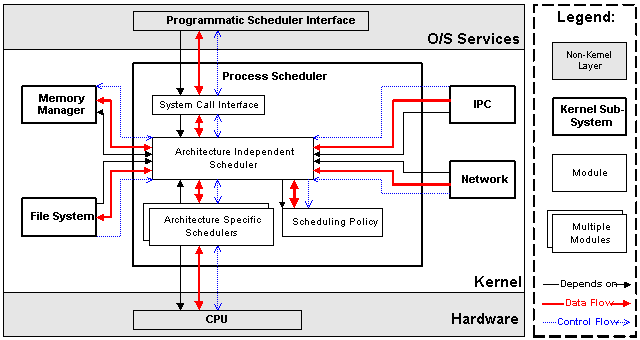
-
内存管理
负责管理Memory(内存)资源,以便让各个进程可以安全地共享机器的内存资源。
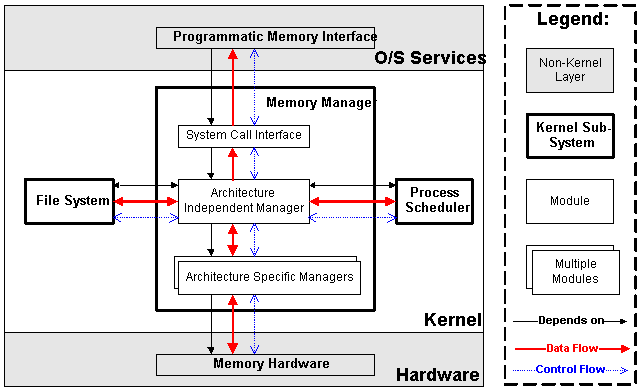
-
文件系统
Linux内核将不同功能的外部设备,抽象为统一的文件操作接口(open、close、read、write等)。

-
网络管理
负责管理系统的网络设备,并实现各类网络标准。
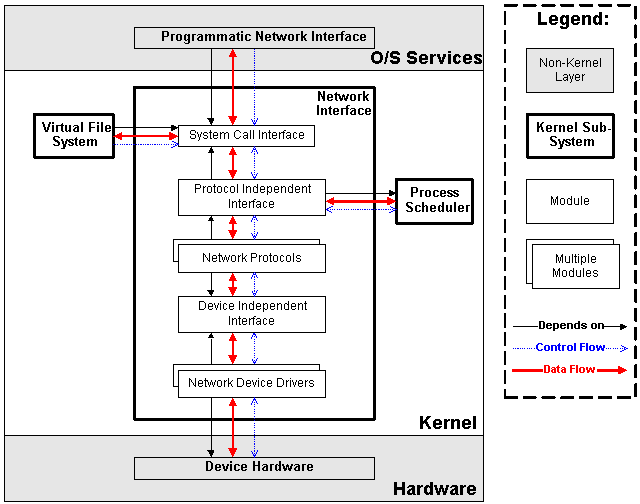
-
硬件驱动
将系统操作映射到物理设备,除了处理器,内存等个别实体外,一般设备控制操作都由寻址设备相关的代码进行。
-
进程间通信
不管理硬件,只负责Linux系统中进程之间的通信。